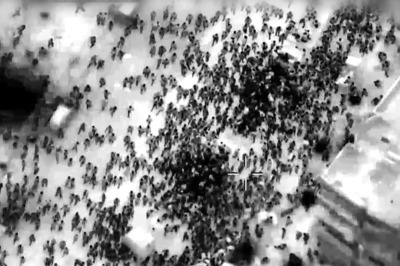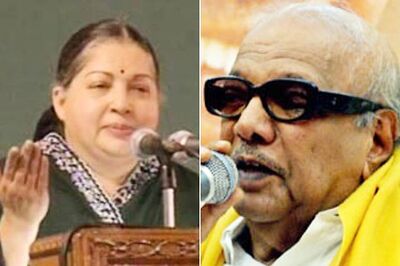
views
Santa Maria: The owner of a nightclub in southern Brazil where more than 230 people died in a fire last weekend deflected blame to "the whole country," as well as to architects and inspectors charged with making sure the building was safe, his lawyer said on Wednesday.
Attorney Jader Marques said his client, Elissandro Spohr, "regretted having ever been born" because of his grief over the fire, but still blamed Sunday's tragedy on "a succession of errors made by the whole country."
Police investigating the blaze have said it likely started when a country music band performing at the Kiss nightclub in the college town of Santa Maria lit a flare, which ignited flammable soundproofing foam on the ceiling. That initial error was compounded by the near-total lack of emergency infrastructure such as a fire alarms or sprinkler systems, police have said. The club also had only one working door and a faulty fire extinguisher.
Marques insisted in a phone interview with The Associated Press that "my client's responsibility is having trusted too much in the inspectors and in those responsible for the construction."
"Hindsight is 20-20," he said, stressing that public officials had signed off on the club.
The number of injured jumped to 143 on Wednesday after 22 people were admitted to hospitals with respiratory problems after having escaped the club apparently unharmed. Brazil Health Minister Alexandre Padilha has urged the fire's survivors to remain alert for any symptoms of so-called "chemical pneumonia," which can take up to three days to develop following exposure to toxic fumes and smoke.
The blaze also claimed another life late on Tuesday, raising the death toll to 235, as a 21-year-old man with burns covering 70 percent of his body succumbed to his wounds. The man's older brother was also killed in the fire and buried on Sunday. Their grieving mother, Eliane Goncalves, had pinned her hopes on her younger son making a recovery.
"When they went out at night, I blessed them," the G1 internet portal quoted Goncalves as saying. "I asked myself how I would be able to sleep with both of my boys out. But what could I do, follow them? God bless them."
On Wednesday, a young tagger sprayed oversized white graffiti reading "justice for all" on the facade of the club as onlookers cheered and police watched from below, Brazilian media reported. He then escaped over neighboring roofs, the reports said.
Earlier this week, police detained Spohr, the club's other co-owner and two musicians who were playing in the club when the fire broke out, and are holding them for five days as part of the investigation. Spohr is recovering from a respiratory infection and is said to be suffering from depression in police custody at a hospital in a nearby town.
Lilian Caus, one of the officers watching over Spohr, said he had made a suicidal gesture, removing a shower hose and tying it to a bathroom window Tuesday.
"By the way it was tied it looked like he wanted to use it to hang himself by the neck, but he didn't even use it," Caus said. "There seems to have been the intention to use it."
Marques denied reports that overcrowding helped cause Sunday's tragedy, insisting there were only 600 to 700 people in the club at any one time. Capacity for the 615-square-meter (6,650-square-foot) nightspot stood at less than 700, though the band's guitarist told media that the space was packed with an estimated 1,200 to 1,300 people. Police have given the same estimate.
Marques insisted that any higher tallies of people at the club that night were due to club-goers cycling in and out.
Authorities have said that of the 143 people still hospitalized, more than 70 are still in life-threateningly critical states.
The tragedy raised questions about the reliability of safety regulations in a nation set to host the World Cup and Olympic Games. Documents obtained by The Associated Press, including past building and fire safety plan permits issued to the club, showed that the single exit, the foam insulation and other contributors to the tragedy didn't violate laws.
"Do I agree with the fact that there was only one exit? No," said Maj. Gerson Pereira, an inspector with the local fire department. "Do I agree that the roof was covered with flammable material? No, I don't. I would have liked to shut down this place, but then the firefighters could be sued" because no law had been broken.
The same documents show that other regulations were broken, including irregularities in the fire safety inspection of the club, as well as pyrotechnics used by the band that police say should not have been set off indoors. Police inspectors say any of the violations was reason enough to shut the club down.
One document shows the club had already been labeled by fire officials a "medium" risk for a fire. By state law, that designation requires the club undergo annual inspections, but records show that the last inspection took place in August 2011.
Survivors have said the club's fire extinguishers failed to work in early attempts to battle the blaze. Under state law, an extinguisher must have a receipt showing that it had been independently inspected within a year.
"It's not that this club was working to come within this or that law - the place should have never been open in the first place," Arigony said. "This is a problem that is seen across Brazil, these laws. I can only hope this tragedy brings about change."
Jaime Moncada, a U.S.-based fire-safety consultant with nearly three decades experience in Latin America including large projects in Brazil, said he was not surprised that one exit was permissible under local law.
"For an American audience, it is crazy to think that a place would have only one exit," he said.
In Brazil, he added, that would be the norm.
Amid the shock of what was the world's deadliest nightclub fire in a decade, changes in Brazil seemed on the horizon.
In Brasilia, the nation's capital, lawmakers in the lower house worked on a proposal that would require federal safety minimum standards across Brazil. Now states individually create such laws. The newspaper O Globo reported on its website that the mayor's office in Santa Maria ordered all nightclubs closed for 30 days while inspections are carried out.
Elsewhere, the government of the country's biggest city, Sao Paulo, set to host the opening match of the 2014 World Cup, promised tougher security regulations for nightclubs.
The fire even sparked action in the Central American country of Nicaragua, which is banning the use of fireworks or other incendiary devices in nightclubs and other enclosed spaces, police spokesman Francisco Diaz said Wednesday.
He said President Daniel Ortega had issued the total ban on flares, fireworks and other such devices and ordered police to strictly enforce it.
He said police would also be checking all nightclubs, bars and other entertainment venues to make sure they comply with regulations requiring at least one emergency exit, separate from the main entrance, and a government-approved emergency plan. He said venues would have 45 days to comply.




















Comments
0 comment